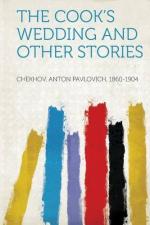Meanwhile the sun began to break through the morning mist; its slanting rays gilded over the autumn frost. There was a sound of steps and voices. Zotov put back the broom in its place, and went out of the yard to see his crony and neighbour, Mark Ivanitch, who kept a little general shop. On reaching his friend’s shop, he sat down on a folding-stool, sighed sedately, stroked his beard, and began about the weather. From the weather the friends passed to the new deacon, from the deacon to the choristers; and the conversation lengthened out. They did not notice as they talked how time was passing, and when the shop-boy brought in a big teapot of boiling water, and the friends proceeded to drink tea, the time flew as quickly as a bird. Zotov got warm and felt more cheerful.
“I have a favour to ask of you, Mark Ivanitch,” he began, after the sixth glass, drumming on the counter with his fingers. “If you would just be so kind as to give me a gallon of oats again to-day. . . .”
From behind the big tea-chest behind which Mark Ivanitch was sitting came the sound of a deep sigh.
“Do be so good,” Zotov went on; “never mind tea—don’t give it me to-day, but let me have some oats. . . . I am ashamed to ask you, I have wearied you with my poverty, but the horse is hungry.”
“I can give it you,” sighed the friend—“why not? But why the devil do you keep those carcases?—tfoo!—Tell me that, please. It would be all right if it were a useful horse, but—tfoo!— one is ashamed to look at it. . . . And the dog’s nothing but a skeleton! Why the devil do you keep them?”
“What am I to do with them?”
“You know. Take them to Ignat the slaughterer—that is all there is to do. They ought to have been there long ago. It’s the proper place for them.”
“To be sure, that is so! . . . I dare say! . . .”
“You live like a beggar and keep animals,” the friend went on. “I don’t grudge the oats. . . . God bless you. But as to the future, brother . . . I can’t afford to give regularly every day! There is no end to your poverty! One gives and gives, and one doesn’t know when there will be an end to it all.”
The friend sighed and stroked his red face.
“If you were dead that would settle it,” he said. “You go on living, and you don’t know what for. . . . Yes, indeed! But if it is not the Lord’s will for you to die, you had better go somewhere into an almshouse or a refuge.”
“What for? I have relations. I have a great-niece. . . .”
And Zotov began telling at great length of his great-niece Glasha, daughter of his niece Katerina, who lived somewhere on a farm.
“She is bound to keep me!” he said. “My house will be left to her, so let her keep me; I’ll go to her. It’s Glasha, you know . . . Katya’s daughter; and Katya, you know, was my brother Panteley’s stepdaughter. . . . You understand? The house will come to her . . . . Let her keep me!”




